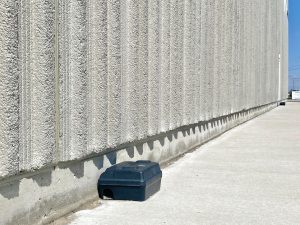
Rodenticides are commonly used to control infestations of rodents such as rats and mice. However, rodenticides can harm other wildlife, pets and even people. We’re especially concerned about the impacts on birds of prey, such as owls and eagles, that can suffer secondary poisoning by eating rodents that have been exposed to rodenticides. For example, Salthaven Wildlife Rehabilitation and Education Centre treats many animals that suffer from secondary rodenticide poisoning, and their patients represent just a tiny fraction of wildlife being affected in our region. Rodenticides are widely used in London and bait stations (with poisoned food) can be found inside and outside many commercial and residential buildings.

Used alone, rodenticides offer limited protection against future infestations. Rodents can multiply very quickly and if they are able to enter a building and find food, they will keep coming back and replacing others killed by poison. It is important to address the causes of rodents entering buildings in the first place.
Fortunately, there are inexpensive, safer and more effective means of controlling pest infestations. This pilot program will help participants in London to access solutions, such as creating habitat near buildings for raptors that prey on rodents, identifying and sealing rodent points of entry into buildings, removing or containing rodent attractants (especially food) and applying rodent deterrents.
The Responsible Rodent Pest Management pilot program will provide selected homeowners and businesses with microgrants to receive support for implementing effective preventative methods.
Program participants will receive:
- A subsidized building inspection conducted by a licensed pest management service provider. This inspection will help to identify access points and reasons why rodents are entering the building;
- Financial support ($200 for homes and $300 for businesses) that can be put towards recommended services or purchasing do-it-yourself supplies to reduce the risk of rodent pest infestations in buildings;
- Technical support with developing a plan to limit rodent infestations in buildings;
- A sign with information about responsible pest management;
- Participating businesses will receive an owl nest box to place outside and use as a natural pest control solution. Additional nest boxes will be made available for purchase to participating homeowners and the general public.
Who is eligible to participate:
- Occupants or managers of buildings that have had pest rodent issues in the past;
- Homeowners, renters with their landlord’s consent, and businesses are welcome to apply; we encourage applications from low-income households and small businesses;
- Participants must be located in London, Ontario;
- Buildings may be located anywhere, but the program will prioritize buildings near natural areas (to limit impacts of rodenticides on wildlife)
- Multi-family residential buildings, and large industrial or agricultural buildings, are not eligible.
Expectations of participants:
- Commit to eliminate use of rodenticides on their property;
- Attend a 1-hour information session in September, virtually or in-person;
- With program support, schedule and attend a building inspection appointment with a pest management service provider in September or October;
- With program support, develop an action plan to block rodent points of entry and/or reduce rodent attractants and/or adopt other methods of humane pest control, and provide a brief report on its implementation;
- Purchase their own supplies and submit receipts for reimbursement.
Additional asks of participants:
- Help to promote the program and share knowledge with others, such as posting on social media, displaying a provided information sign or contributing a testimonial;
- Grant permission to the London Environmental Network to take photographs and videos to be used in print publications, online publications, presentations, websites, and social media.
Applications are now closed. Applicants will be informed of the decision in the first week of September. Stay tuned!
Learn more about responsible pest management from the following resources:
Raptors Are The Solution (RATS)
Bird Friendly London – About Pest Management
Salthaven Wildlife Blog About Rodenticides
Integrated Pest Management for Rodents: A Guide for Residents
